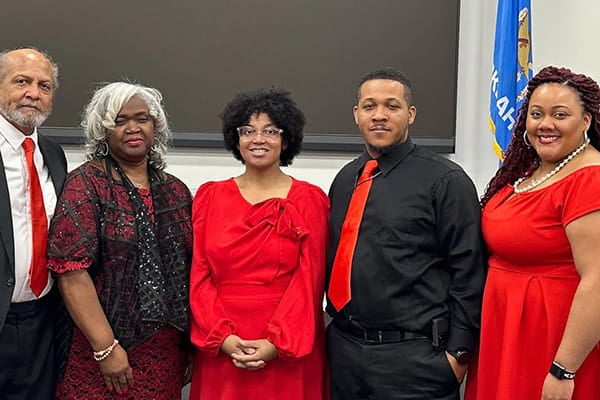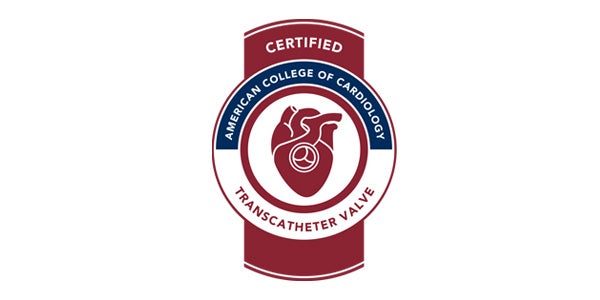
Helping the next generation of healthcare workers
February 4, 2026
Ascension St. John workforce development manager felt called to come back to the place where she started her career to help the Tulsa community explore careers in healthcare.
Get care from a leader in heart valve and structural heart care at Ascension St. John in Tulsa, Oklahoma.

Get care from a leader in heart valve and structural heart care at Ascension St. John in Tulsa, Oklahoma.
When you choose Ascension St. John for your heart care, your doctor is part of a nationally recognized heart program in northeastern Oklahoma for minimally invasive heart valve procedures.
Cardiologists at Ascension St. John specialize in heart and valve disease, which is when one or more heart valves don’t work properly. The valves normally keep blood flow moving forward in one direction. And they prevent the backward flow of blood as it leaves each chamber of the heart.
There are two main types of heart valve disease:
Heart valves can develop both regurgitation and stenosis at the same time. Also, more than one heart valve can be affected at the same time.
Common symptoms of heart valve disease and heart arrhythmias include:
Your doctor may think you have heart valve disease if your heart doesn’t sound right through a stethoscope. They may hear abnormal sounds because of abnormal blood flow across a valve.
A tiny, hollow tube (catheter) is put through a large artery or vein in the leg or arm leading to the heart. It measures heart pressure. Contrast dye is injected so the healthcare provider can see images of the heart and blood vessels.
This imaging procedure uses an X-ray machine and a computer to create 3-D pictures of the heart. Sometimes a dye is injected into a vein so that your heart arteries can also be seen. Sometimes medicine is given to lower your heart rate so it captures a better image. It can also be used to find out how much calcium is in your heart arteries. Calcium is a marker for coronary artery disease.
This procedure uses a combination of large magnets, radio waves, and a computer to make detailed images of organs and structures in your body. Your doctor may order an MRI of the heart to look at the heart valves and major vessels. It can also detect coronary artery disease and how much damage it has caused. It can also assess heart problems that have been present since birth. It can find tumors and other conditions. Your doctor may order this test before other procedures such as angioplasty or stenting of the coronary arteries and heart or vascular surgery.
This test makes images of internal tissues, bones, and organs on film. An X-ray can show enlargement in any area of the heart.
It's used to check the heart's function and structures. During the procedure, a transducer (like a microphone) sends out sound waves at a frequency too high to be heard. When the transducer is placed on the chest at certain locations and angles, the sound waves move through the skin and other body tissues to the heart tissues. The waves bounce or "echo" off the heart structures. These sound waves are sent to a computer that can create moving images on the screen of the heart walls and valves.
This test records the electrical activity of the heart, shows abnormal rhythms (arrhythmias), and can sometimes detect heart muscle damage.
This is also called a treadmill or exercise ECG. This test is done to monitor the heart while you walk on a treadmill or pedal a stationary bike. Your doctor also monitors your breathing and blood pressure. A stress test may be used to detect coronary artery disease, or to determine safe levels of exercise after a heart attack or heart surgery. This test can also be done using special medicines that stress the heart in a similar manner as exercise does. Sometimes a stress test will collect ECG information along with heart ultrasound pictures. This is called an exercise or stress echocardiogram (echo). It's more sensitive and specific than ECG stress testing alone.
This test is similar to a transthoracic echocardiogram. But it's done with medicine to help you relax (sedation). It's considered invasive because a probe is put into your body. In this test, you will swallow a small probe about the size of your thumb. The probe passes down the esophagus, which lies directly behind the heart. It allows a much closer look at the heart's structure and function than a standard echocardiogram done on the skin of the chest. It can better look at heart valve structure and function. Your doctor can better see any blood clots that may be in the heart.
Treatment for heart valve disease may include medication, therapy or surgery.
For this nonsurgical procedure, a special hollow tube (catheter) is put into a blood vessel in the groin and guided into the heart. At the tip of the catheter is a deflated balloon that is inserted into the narrowed heart valve. Once in place, the balloon is inflated to stretch the valve open, and then removed. This procedure is only used to treat stenotic (narrowed) valves.
Your cardiologist may recommend medications to help manage your heart condition. Mediation may be used to lower blood pressure, prevent blood clots, lower cholesterol and more.
For this nonsurgical procedure, a new aortic valve is placed inside the older narrowed valve. This is done using catheters, balloons, and wires inserted through the arteries of the groin. Or in some cases, they may be inserted through the arteries of the arms or the apex of the heart. This procedure is currently used mostly for aortic stenosis, although it is being studied for use for aortic regurgitation.
These are minimally invasive procedures. The healthcare provider replaces the heart valves. It's done through an artery (for the aortic valve) or a vein (for the tricuspid, pulmonary, or mitral valve) and is often performed from the groin.
Cardiac surgeons treat complex heart valve disease to repair damaged heart valves through open heart surgery and minimally invasive procedures, including TAVR and MitraClip™. When one or both of your valves do not open or close correctly, it can lead to reduced blood flow, cause the heart to work harder, and result in symptoms such as fatigue, shortness of breath, chest pain, fainting, or even heart failure.
Our doctors are committed to being leaders in cardiovascular research, working to help improve how we diagnose and treat heart and vascular diseases. You can talk to your cardiologist if you are interested in participating in clinical trials.
Get the confidence and peace of mind that your doctor and cardiovascular care plan are right for you. It's easy to get a second opinion with Ascension St. John in Tulsa. We can review your medical records and healthcare history to answer your questions and discuss options. Talk with one of our doctors about a personalized heart care plan.
Before your appointment, check with your insurance company to find out if a second opinion is covered. We can request your medical records on your behalf, so that they can be shared with your care team before your arrival.

American College of Cardiology (ACC) recognizes Ascension St. John as the only accredited TAVR program for heart valve damage in Oklahoma. The ACC also awarded our hospital with the NCDR Chest Pain-MI registry Gold Performance Achievement award. US News & World Report recognized Ascension St. John has a high performing hospital in cardiovascular care.
To make an appointment, schedule an appointment with a cardiologist. You can also ask your doctor about a TAVR evaluation to see if valve replacement is right for you by calling 918-748-7650.
If you are experiencing a life-threatening emergency, go directly to the ER or call 911.
All registered marks are property of their respective owners. All rights reserved.